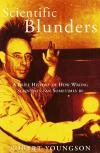Boekenkast

Scientific Blunders
Auteur | Robert M. Youngson |
Eerste Uitgave | 1998 |
Uitgave | 1998 |
Uitgeverij | Robinson Publishing |
Vorm | non-fictie |
Taal | Engels |
Bladzijden | 338 bladzijden |
Gelezen | 2002-08-29 |
Score | 8/10 |
Inhoud
A brief history of how wrong scientists can sometimes be. Embarrasments come in various sizes, but few can rival in sheer, mind-blowing magnitude, some of the mistakes that have been perpetrated in the name of scientific advance. In the past scientific blunders were made largely through ignorance and superstition. Today's scientists are more sophisticated in their errors, yet the end result is the same - the brightest (and often the most big-headed) members of society can sometimes be astonishingly wrong.
Bespreking
A journey through science
The 'Blunders' mentioned in this book are only an excuse to take the reader on an exciting journey through the very broad spectrum of science. You can actually compare this book with a menu card you would get in The Restaurant of Science: a starter of Evolution Theory, a main course of Physics, a slice of Biology and maybe some Technology as a dessert?
The common thread through all these chapters -being how wrong things can get- gives the reader an interesting view on what scientific prove actually means. All scientists are humans (we hope...) and this gives rise to emotional arguments popping up from time to time. What happens when you mix these with experimental research has been illustrated in abundance: carelessness, wrong-headedness, arrogance, moral fear or plain bad luck. Fair, not all 'blunders' are worthy of this tag, quite a lot are just as can be expected from a normal struggle for the truth. But still, science would have been far more advanced if these human influences could have been avoided. But isn't this a utopia?
Although the title might suggest some humorous content, it certainly does not deliver on these expectations. The tongue-in-cheek approach makes the topics quite more readable, but does not reduce the explanations to kindergarten gibberish. It is true that a few facts are plainly wrong, but the main message of the book doesn't suffer from this.
To conclude: it's a nice book intended for a general public and easy to read (I read it on a plane). It lets you browse through popular science in a relaxed manner. Hopefully this will encourage people to dive deeper into the topics they find interesting. But be aware: people who think of science as a sacred institution might get offended by this book.